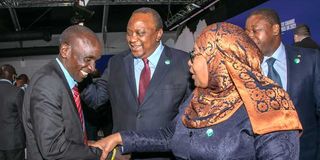Kipchoge calls for faster pace in race to save the planet

From left: World marathon record holder Eliud Kipchoge, President Uhuru Kenyatta and Tanzania president Samia Suluhu on the sidelines of the ongoing 26th United Nations Climate Change Conference (COP26) in Glasgow, Scotland on November 2, 2021.
What you need to know:
- He was referring to the global West, for long castigated by climate change experts for leading the globe down a path of destruction through heavily polluting industry and agriculture, and sitting back and watching Africa, the least polluter, bear the brunt of the effects of climate change.
- “The world is in our dear hands,” pleaded Mr Kipchoge in his trademark soft tone. “We have the will, the knowledge, the expertise and the resources to change it.”
In Glasgow, Scotland
Double Olympic marathon champion Eliud Kipchoge Tuesday challenged global leaders to race harder towards the global goal of saving the planet from a climatic catastrophe, warning that even though they are fast in the deliberations, they are not “as fast as I am”.
A crowd puller at the United Nations Framework Convention on Climate Change in Glasgow, Scotland, also called the COP26, Mr Kipchoge urged the world to “bring our heads together” in the fight against climate change.
He said the time to talk was over, and that this is the time to combine “our unique skills of staying connected to our feelings, aided by the strengths of data and technical innovations”.
He was speaking on the day global leaders, among them President Uhuru Kenyatta, witnessed the launch of new partnerships that will promote finance and climate solutions in Africa and help half a billion farmers around the world to implement regenerative farming practices.
The cluster of new public-private partnerships – which unite captains of industry, finance and philanthropy with leading voices from civil society – address acute climate vulnerabilities countries face while accelerating rates of decarbonisation and resilience building.
The mobilisation of action and scaling-up of finance, especially for Kenya and other eastern African countries facing growing climatic disasters, is critical to advancing the climate action agenda.
“In Kenya we live close to the equator so there are no seasons,” said Mr Kipchoge, addressing an attentive global audience that included heads of states, finance ministers, environmental experts and conservation champions.
“We only have periods in the year that we call the long and short rains. But the rains haven’t been the same for a while now. They often hardly bring any water, and sometimes flood our far field, ruining all crops.”
Drawing parallels between his glorious athletics career and the might of global leaders, Mr Kipchoge noted: “When I look to our world, I see the same metaphor that I see in my career. There are Western countries who are so far advance with data and innovation, but whom are further removed from that initial feeling for the climate.”
He was referring to the global West, for long castigated by climate change experts for leading the globe down a path of destruction through heavily polluting industry and agriculture, and sitting back and watching Africa, the least polluter, bear the brunt of the effects of climate change.
“The world is in our dear hands,” pleaded Mr Kipchoge in his trademark soft tone. “We have the will, the knowledge, the expertise and the resources to change it.”
Mr Kipchoge was echoing the words of the COP President, Mr Alok Sharma, who said: “The science is clear that the window of time we have to keep the goal of 1.5 degrees alive, and to avoid the worst effects of climate change, is closing fast. But with political will and commitment, we can, and must, deliver an outcome in Glasgow the world can be proud of.”
Earlier, global leaders had announced the launch of the Africa Green Finance Coalition (AGFC) – a continent-wide collaboration that will spur the trillions of green investment needed to transform Africa’s economy by accelerating green finance policy and regulatory reforms to attract private capital, both from international and domestic investors.
Ms Ayaan Zainab Adam, CEO of Africa Capital Partners, said: “Africa has a $2.3 trillion investment gap in its core infrastructure which must be addressed. The Africa Green Finance Coalition should help get much needed capital flowing to climate resilient and low carbon infrastructure in strategic sectors such as energy, transport, logistics agriculture and sustainable and low carbon mining and manufacturing.”
Significantly for Kenya, the meeting also launched a new platform dubbed Regen10, which will be used to achieve regenerative food systems this decade across 50 per cent of world food production.
Regen10 will work with over 500 million farmers to apply regenerative production methods, while simultaneously ensuring roughly $60 billion per year is deployed to finance the transition to reverse nature loss in line with the Paris Agreement.
It will drive convergence of existing food and farming sector initiatives and scale up collective action by bringing together farmers along with businesses, investors, NGOs and policymakers to accelerate system change.





